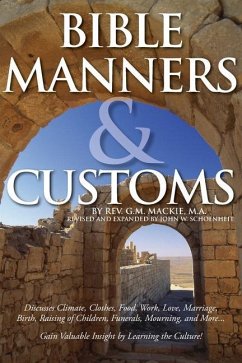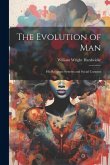"People" magazine, and many others, owe their successful existence to the fact that we human beings like to know about other people. Readers enjoy stories about famous (and even not so famous) people. The Bible is full of people whose lives, and even thoughts, are open before us. All of the drama of life is set before us in the Bible: love and hate, laughter and despair, hope and fear. The better we know the people of the Bible, the more interesting it is, the more fun it is to read, and the more we can learn as we read it. But the people of the Bible lived in a culture that was very different from ours. If we are going to know the people of the Bible, indeed, if we are going to understand the Bible itself, it is imperative that we learn something about the manners and customs of biblical times. Imagine trying to understand modern culture without knowing how we dressed, what we ate, where we lived, and about the jobs that people worked at all day. Under those circumstances it would be easy to misunderstand something we said or did. Yet most people know very little about the daily lives of the thousands of people who fill the pages of the Bible, from Adam and Eve to the Apostle Paul. The Bible becomes much easier to understand, and a much more fun book to read, if we take the time to learn about the manners and customs of the biblical culture. The people of the Bible, and the lessons in it, become alive for us, hold our attention, and make sense. When Samson said that the Philistines had "plowed with my heifer," he was not in any way referring to cattle he owned. Just as our culture refers to girls in various ways, including "dolls, babes, chicks," etc., so in the biblical culture young girls were sometimes referred to as "heifers." Knowing that fact makes the passage understandable, and more fun to read. There are hundreds of examples in Scripture, where the meaning of a verse is clear if the custom is known. Understanding the manners and customs of the Bible can turn a frustrating session of Bible reading into a fun and meaningful session. Knowing biblical manners and customs can mean the difference between understanding and misunderstanding the Bible. This book makes known many of the manners and customs of the people of Palestine. It covers many subjects, including the climate they lived in that affected their daily lives, the clothes they wore, the food they ate, the work that consumed their days, their love and marriage, the birth and raising of children, their funerals and mourning, and more. It helps people understand and enjoy the people of the Bible, and the Bible itself.
Hinweis: Dieser Artikel kann nur an eine deutsche Lieferadresse ausgeliefert werden.
Hinweis: Dieser Artikel kann nur an eine deutsche Lieferadresse ausgeliefert werden.



![Remarks Upon the Life and Manners of the Rev. John Jones, Formerly Pastor of the Independent Church, St. John's, Newfoundland [microform] Remarks Upon the Life and Manners of the Rev. John Jones, Formerly Pastor of the Independent Church, St. John's, Newfoundland [microform]](https://bilder.buecher.de/produkte/65/65553/65553642m.jpg)
![Sketches of the Rites and Customs of the Greco-Russian Church [microform] Sketches of the Rites and Customs of the Greco-Russian Church [microform]](https://bilder.buecher.de/produkte/66/66197/66197059m.jpg)



